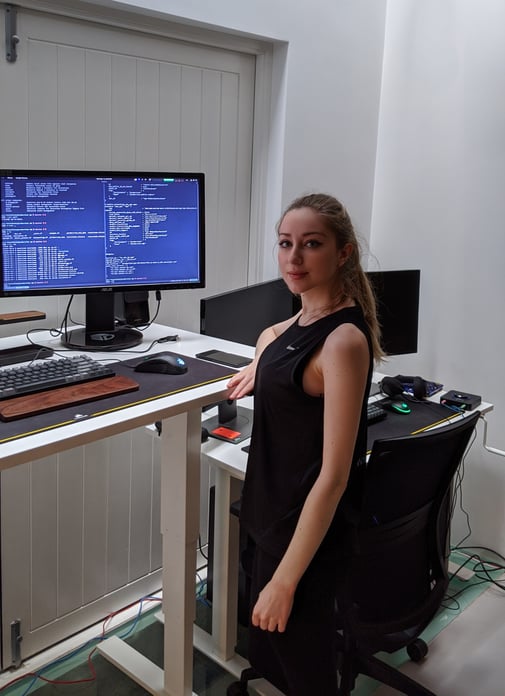Nathalia Rus, Multi-award Technologist, JP Morgan Future 100 and Founding Engineer of Private Collectors Club
This week on Wundamail Voices, we hear from Nathalia Rus, who has shared her thoughts on how businesses might operate and adapt in a post-pandemic world.
What the future of work might look like post-crisis
Companies were forced to have their employees work from home, whether they had initially liked the idea or not: we have seen an early experimentation around remote working practices. I think two sentiments emerge.
Some love working from wherever they want, without wasting time commuting, and having the freedom of movement, or the convenience of staying at home.
Some feel isolated, feel a lack of guidance and/or structure, miss the social interactions and feel that no virtual meeting can replace physical interactions for team building, and do not feel that same sense of community.
Because of this, I do not think that all companies will shut most of their physical offices to completely transition to remote. There is a middle ground - a compromise to find.
Most likely, there will be optionality in place, and flexibility. People will have to attend specific meetings physically, and outside of those meetings, they can choose everyday whether they feel like going there or whether they’d prefer to do the work remotely.
Over time, companies will have an idea of the total amount of office space they will need given people's attendance choices. The space required will likely be smaller, but how much smaller will depend on two things: one, the company’s culture and two, how efficient the company is at handling remote collaboration.
I think this will be the direction that most larger companies will take. In the case of startups, I can see how it would be easier than before to choose a remote culture from the outset, and hire people who are compatible with that way of doing things.
It will be interesting to see new places emerge as expatriate hotspots: new innovation hubs, new international schools, etc. Many employees might then have the opportunity to live in places where they previously thought they would not be able to live, because it would mean having to give up on work opportunities. Now it feels less risky to move to where they believe they can find a higher quality of life.
Before, moving to those places not only meant a trade-off with work opportunities, but also with social opportunities (networking, dating, etc) compared to big cities like New York or London. This social aspect might be solved if more people end up in the same situation of being able to work remotely without giving up on career opportunities, as more and more people will end up in the same place. I am thinking in particular of SouthEast Asia, for example, Thailand.
But while more companies will go fully-remote, it may not be most.
In all, I think that to attract the best talent, companies will have to offer employees flexibility and optionality. Going fully-remote is not necessary to attract the best talent, as it is not necessarily better for the individual than office-based work. It is a subjective choice. So companies that do choose to go fully remote may not attract the best talent for that reason. This being said, they might attract people who see that company’s culture as their ideal, and for that reason, it might help them to retain the people they hire. But if each company hires someone who is aligned with their vision and culture, they should be able to retain talent anyway. Nothing much changes there: there are just more viable ways of doing things available.

How Managers and Leaders Should Prepare
Well, it may look like “just” an admin concern, but I believe teams must first get very comfortable with technological tools for remote collaboration in such a flexible environment: so everyone is on the same page and knows what is going on. Communication skills will need to be adapted to this situation.
At Private Collectors Club, the go-to management platform for collector communities that I recently co-founded with Charles Clegg (historic racer & life-long automotive enthusiast ) and Jeremy Hindle (YC alumni, Forbes under 30 and serial tech-entrepreneur), we are all about this: set expectations, and measure. This also allows us to give precise and regular feedback for personal growth.
For people to meet those expectations, the processes and tools need to be there to help them be efficient with their time and clear all misunderstanding. In order for you to measure, you need those same tools and processes put into place. So it’s really important for both sides.
Our startup uses Discord as our main direct communication tool. It has video/audio meeting rooms and additional channels on top of the purely work-based ones such as “random”, and “fun times” for team-building. We use Notion for most of our written updates around what we’re up to, with daily roundups, tasks, Wikis, etc. For coding-related issues, though, we mainly stay with GitHub.
Whatever tool you choose, make sure the team knows exactly how to use them and what the process is. Set expectations around how each person should use collaboration tools and how often. This way you can truly create routines where you do not waste any time asking around and calling people up, which disturbs their flow and yours. You know exactly what should be where, and exactly how to find the information you are looking for. This makes it very easy to give targeted feedback in a precise and efficient way. It also saves a lot of time spent on meetings because the structure is clear and all the information needed is there directly. This is where you can spend that time gained in team-building instead, if you like.
There is a fine line between setting expectations and micromanaging.
Micromanaging is telling someone what they should do next, and leads to nagging someone to do the next thing, if it hasn’t been done. What should you do instead? Set expectations from the start, trust, and then measure. Adjust expectations or reiterate them, and repeat. If there are problems, this is where communication is key. With flexible working, communication skills will be even more important than it was before.
Virtual communication, especially written communication, can be tricky to interpret. The tone of voice isn’t there and it takes a lot of subtleties to get the written tone right. With explicit expectations, the right processes, feedback loops, and routine meetings in place, it might actually be easier to see the output that each person produces. This is because everything is documented and organised in specific ways, so it’s easier to get on top of things and get an idea of the next steps.
When everything is going well, that’s great. The downside, though, is that it might be way more difficult to handle something going wrong: there are a lot of cues in physical interactions, where we can identify if something isn’t right with someone. You can sense if they are tired or, for example, you would have more opportunities for random interactions where they may confide personal problems so you can have a better idea of if something is affecting their performance.
Where there’s nothing personal going on and the output isn’t up to scratch because someone needs upskilling, well, it’s also more difficult to handle remotely. Sure, there can be virtual courses, but they do not offer the same structure and guidance that on-site mentors can provide, nor the same experience regarding emotional support.
So, leaders and managers must prepare to nurture and upskill people - something a lot of people might already feel is an art in itself - when the conditions to do so are not as ideal as on-site. It might take some time to do this correctly, and over time I think we will see new interesting pieces of advice around this starting to emerge. Especially those based on how many remote working practices were rushed and had to be improvised: a lot of mistakes will have been made and there will be much to learn from them.
A Step in the Right Direction?
As said above, there is no right or wrong way to work, some people prefer working remotely, others prefer physical interactions with their colleagues, the sense of mission and community which can be difficult when working virtually.
This being said, I still think it’s a step in the right direction because people and companies should have the option to choose what works best for them.
At Private Collectors Club, we will go back to the office while allowing for flexible working. The important thing is that people care about what they do, enjoy the company of the people they work with, love who they work for and add value to their core mission, as much as we, as leaders, can add value to our employees by capturing opportunities for personal growth.
To hear more from Nathalia, check out her social media channels!


